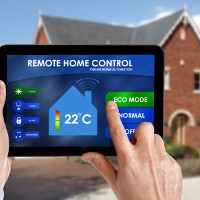Smart homes becoming more in demand
- Details
- Published on Tuesday, 11 August 2015 16:08
- Written by PRNewswire
The smart home is here to stay.
A survey of U.S. adults by Coldwell Banker Real Estate LLC and CNET found that Americans are already embracing the smart home with 28 percent owning at least one smart home product and almost half of Millennials (ages 18 to 34) adopting the technology.
"Smart home technology is catching on because it is literally changing the way we live in our homes," said Sean Blankenship, chief marketing officer for Coldwell Banker. "Not only is it shifting the financial perception of the home, but it's also transforming our emotional connection to our homes. We have entered a transformative era. We believe that in three to five years, home buyers will expect smart home technology; it will become the new norm."
Blankenship cited the fact that of those surveyed currently using smart home technology, 81 percent said they would be more likely to buy a home if smart technology, such as connected lighting, thermostats, remote-access security and smart locks, was already installed. For Americans who currently don't own smart home products, this provides an opportunity to make the move and adopt the technology. The trend will grow as millennials start to represent a larger share of homeowners.
The Coldwell Banker/CNET survey of approximately 4,000 Americans analyzed trends and insights related to smart home technology.
Smart Homes Save Money, Time and Provide Peace of Mind
Americans are adopting and strongly valuing smart home technology. In fact, 91 percent of those who currently own smart home products would recommend the technology. Other findings include:
- 87 percent say the technology makes their lives easier.
- 57 percent of Americans who own smart home products say the technology saves them time and at an average of almost 30 minutes per day.
- 45 percent of Americans say that, on average, their smart home technology saves them over $1,100 a year.
- 72 percent say smart home products provide them with peace of mind when it comes to home security.
Parents with children under age 18 are almost twice as likely to have smart home products (42 percent of those with children vs. 23 percent of those with no children).
- Parents were also more likely to have made their home "smart" when they moved in (68 percent of those with children vs. 50 percent of those with no children).
- Security is top of mind for those with kids, as 78 percent of parents say smart home products provide peace of mind; only 68 percent of those without children agreed with the statement.
- Among all respondents, 59 percent of parents said they'd be willing to pay more for a home with smart home technology installed. This is significantly higher than the 47 percent of those without children.
Other Key Survey Findings
- The smartphone is the remote control for your smart home. Seventy-six (76) percent of those with smart home products control them with a mobile device.
- The living room is the "smartest." When asked which rooms benefit from smart home technology, over half (51 percent) cited the living room, followed by the bedroom (45 percent), family / rec room (35 percent), kitchen (30 percent) and dining room (21 percent).
- Cost and savings are key to smart home purchasing decisions. Of those who do not have smart home products, 44 percent said they would consider purchasing the technology if it cost less, while 42 percent said they would consider purchasing if it would save them at least $500 yearly on utility bills and household expenses.
"From the living room to the yard, consumers are embracing smart home technology," said Lindsey Turrentine, editor-in-chief of CNET.com. "This market will continue to develop as the technology becomes even more mainstream. Our survey highlights the fact that this innovation has made its way into homes faster than many expected, and that once a homeowner tries a connected device, that person is ready to experiment with more smart products."
"Today's buyers are expecting smart home technology. It's no longer just an add-in," said Danny Hertzberg, sales associate affiliated with Coldwell Banker Residential Real Estate in Miami, Fla. "I'm seeing first-hand how homebuyers are requesting and favoring homes with smart features, such as automated lighting and temperature control. Smart home technology is also influencing the home selling process. In addition to de-cluttering a home, sellers are upgrading to smart home technology to attract modern buyers. Consumers are truly seeing the convenience and benefits of these products, understanding how smart home technology makes the home more comfortable, convenient and energy-efficient."
The full survey results can be found here.
This survey was conducted online within the United States on June 18 and 19, 2015 by Harris Poll. The survey was conducted among 4,043 adults (ages 18 and over) among whom 1,141 own at least one smart home product. For the purposes of the survey, "smart home technology/products" were defined as products or tools that aid in controlling a home's functions such as lighting, temperature, security, safety, and entertainment, either remotely by a phone, tablet, computer or with a separate automatic system within the home itself. Figures for age, sex, race/ethnicity, education, region and household income were weighted where necessary to bring them into line with their actual proportions in the population. Propensity score weighting was used to adjust for respondents' propensity to be online.


















































